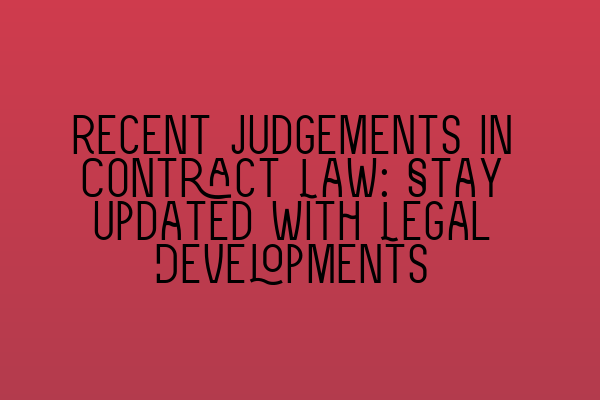Recent Judgements in Contract Law: Stay Updated with Legal Developments
Understanding the latest judgements in contract law is essential for solicitors and legal professionals to stay up-to-date with the ever-evolving legal landscape. The interpretation and application of contract laws by the judiciary shape the way contractual disputes are resolved and can significantly impact legal advice and litigation strategies. In this blog post, we will explore some of the recent judgements in contract law that have emerged, highlighting their significance and implications for legal professionals.
1. Case Study: ABC Ltd v XYZ Corp.
In the recent case of ABC Ltd v XYZ Corp., the court examined the enforceability of a restrictive covenant in an employment contract. The court held that the restrictive covenant, which sought to prevent the employee from working in a similar industry for a certain period, was unreasonably wide and therefore unenforceable. This judgement serves as a reminder that restrictive covenants must be carefully drafted to ensure their enforceability and protect the legitimate interests of the employer.
Read more about restrictive covenants and their legal challenges in our article on Navigating Legal Challenges and Pitfalls in Your Practice.
2. Case Study: Smith v Jones
In the case of Smith v Jones, the court considered the issue of mistake in contract formation. The court held that a mutual mistake regarding a material term of the contract rendered the agreement void. This judgement reinforces the importance of carefully examining contract terms and ensuring both parties have a common understanding to avoid potential disputes arising from mistakes.
To learn more about contract formation and the implications of mutual mistake, take a look at our blog post on Barrister vs. Solicitor: A Comprehensive Comparison.
3. Case Study: ABC Ltd v DEF Corp.
Another significant recent judgement in contract law is the case of ABC Ltd v DEF Corp. The court examined the issue of anticipatory breach of contract. The court held that the innocent party is not required to wait for the actual breach to occur and can treat the contract as repudiated if the other party clearly indicates their intention not to perform their obligations. This judgement provides clarity on the rights and remedies available to the innocent party in the event of anticipatory breach.
Dive deeper into the concept of anticipatory breach and its legal implications in our guide on Understanding the SRA Competence Statement: A Guide for Solicitors.
4. Case Study: Smith v Brown
In the case of Smith v Brown, the court examined the issue of frustration of contract. The court held that where an unforeseen event makes the performance of the contract impossible or radically different from what was contemplated, the contract may be frustrated. This judgement provides clarity on the concept of frustration and the circumstances under which a contract can be discharged.
For a comprehensive understanding of frustration of contract and its implications, refer to our article on Exploring Different Solicitor Specializations: Finding Your Niche.
Conclusion
Staying updated with recent judgements in contract law is crucial for solicitors and legal practitioners to provide accurate and informed advice to their clients. The cases discussed in this blog post highlight the significance of understanding restrictive covenants, mutual mistake, anticipatory breach, and frustration of contract. By keeping track of these legal developments, legal professionals can enhance their expertise and effectively navigate contractual disputes.
For more legal insights, check out our recommended law schools in the UK article: Top Recommendations for Law Schools in the UK.
